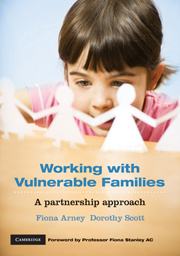Book contents
- Frontmatter
- Foreword
- Contents
- List of figures, tables and boxes
- Contributors
- Acknowledgements
- Introduction
- Chapter 1 Think child, think family, think community
- Chapter 2 Family strengths: an international perspective
- Chapter 3 Harnessing ‘resilience’ when working with children and families
- Chapter 4 Working within and between organisations
- Chapter 5 Family-centred practice in early childhood settings
- Chapter 6 Sustained nurse home visiting with families of Aboriginal children
- Chapter 7 Including fathers in work with vulnerable families
- Chapter 8 Parenting in a new culture: working with refugee families
- Chapter 9 Responding to parents with complex needs who are involved with statutory child protection services
- Chapter 10 Engaging family members in decision making in child welfare contexts
- Chapter 11 Supporting parents whose children are in out-of-home care
- Chapter 12 Using evidence-informed practice to support vulnerable families
- Chapter 13 Spreading promising ideas and innovations in child and family services
- Index
Chapter 5 - Family-centred practice in early childhood settings
- Frontmatter
- Foreword
- Contents
- List of figures, tables and boxes
- Contributors
- Acknowledgements
- Introduction
- Chapter 1 Think child, think family, think community
- Chapter 2 Family strengths: an international perspective
- Chapter 3 Harnessing ‘resilience’ when working with children and families
- Chapter 4 Working within and between organisations
- Chapter 5 Family-centred practice in early childhood settings
- Chapter 6 Sustained nurse home visiting with families of Aboriginal children
- Chapter 7 Including fathers in work with vulnerable families
- Chapter 8 Parenting in a new culture: working with refugee families
- Chapter 9 Responding to parents with complex needs who are involved with statutory child protection services
- Chapter 10 Engaging family members in decision making in child welfare contexts
- Chapter 11 Supporting parents whose children are in out-of-home care
- Chapter 12 Using evidence-informed practice to support vulnerable families
- Chapter 13 Spreading promising ideas and innovations in child and family services
- Index
Summary
Learning goals
This chapter will enable you to:
Recognise the potential of early childhood practitioners in health and education settings to engage parents of vulnerable children in ways that will enhance their ability to nurture and protect their children
Understand contemporary developments in policy and practice in relation to family-centred early childhood services
Learn about some innovative exemplars of Australian family-centred initiatives in early childhood settings and consider what might be applicable to other settings
Be sensitive to the needs of children and parents from culturally diverse backgrounds
Think about how different professions and services can work together for and with vulnerable families and their children
Reflect on the professional and personal challenges that may be faced when responding to the needs of vulnerable children and their families.
Introduction
We are in an exciting era of innovation in early childhood services. With the (re) discovery of the importance of the ‘early years’, new ideas about how early childhood services can be delivered, regardless of whether they are traditionally seen as ‘health’, ‘education’ or ‘social welfare’ services, are blossoming. Strengths-based ways of working with families are influencing how practitioners are reaching out to parents and enhancing their ability to nurture and protect their children (see Chapter 2 for more on family strengths approaches). Policies, programs and face-to-face practice are all in the process of transformation.
- Type
- Chapter
- Information
- Working with Vulnerable FamiliesA Partnership Approach, pp. 91 - 108Publisher: Cambridge University PressPrint publication year: 2010



